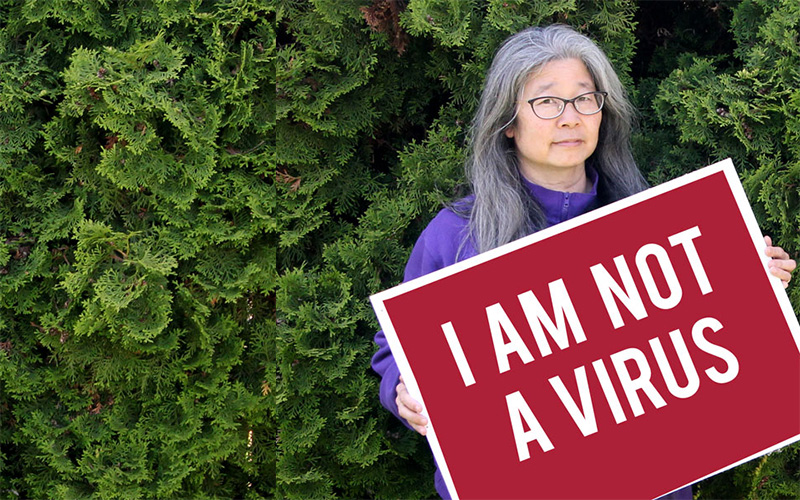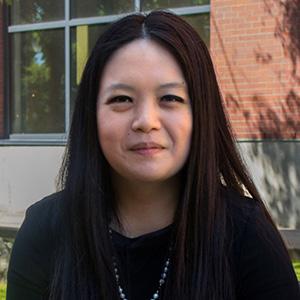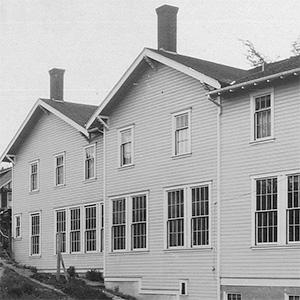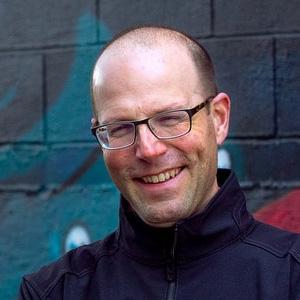
'Talking About the Hard Stuff'
The COVID-19 pandemic brought out the best in people and the worst, the latter being racism directed at the Asian American community.
This Section's arrow_downward Theme Info Is:
- Background Image: ""
- Theme: "light-theme"
- Header Style: "purple_dominant"
- Card Height Setting: "consistent_row_height"
- Section Parallax: ""
- Section Parallax Height: ""
Pictured above: UW Tacoma graphic designer Megan Kitagawa
This feels like a big moment in U.S. and world history. The events of the past few months have forced many of us to change how we experience the world. The COVID-19 pandemic altered how we work, play, interact, grieve and even think. The mental and emotional stress of trying to navigate this upside down landscape made it almost impossible to bear what came next.
The recent deaths of George Floyd in Minneapolis and Manuel Ellis here in Tacoma once again brought to the forefront issues that have long existed in this country. The brutality of Floyd’s murder — the callousness of ignoring a man’s pleas of “I can’t breathe” — struck an emotional chord whose vibrations will likely be felt for years.
We are going to be devoting time in the coming weeks and months to talking about racism in the United States, including in our own backyard. About a month ago we decided to do a podcast episode about racism directed toward Asian Americans during COVID-19. It took a while to put together the interviews and to edit them into a coherent story. We decided to run this story now because the racism experienced by Asian Americans is still very real. And we are in the process of putting together a podcast about Mr. Floyd’s death and the racism experienced by Black men and women in this country. These are important issues and we are working out how best to discuss them and who we need to include in this conversation.
Below is an excerpt from a conversation with Rachel Endo, Dean of the School of Education at UW Tacoma. This episode also includes a reflection by Staff Psychologist Paolo Laraño as well as insights from UW Tacoma students Melissa Atienza and Joseph Dayonot.
Eric Wilson-Edge: I wonder if you can talk about racism you’ve experienced in your own life?
Dean Endo: The West has viewed Asians as either exotic foreigners, or that we’re dirty and we're always inciting violence and that we spread diseases. This type of rhetoric has been around for centuries in the United States.
So when I am asked questions like ‘where are you really from,’ it's really interesting because when I tell people, ‘oh yeah, I was born and raised in Omaha, Nebraska’ they're not satisfied with that. They'll say, ‘well, where are you really from?’ And they'll ask me again and again, and as a kid that was really confusing to me.
I learned later that this is connected to a long history of anti-Asian sentiment, where we were actually legally barred from citizenship until the early 1950s. This notion of not being American and having to defend my existence in this country is really weird because, again, I was born and raised in Nebraska. I'm American, but yet I can't even call my country my own because many of our neighbors and citizens don't view me or other Asian Americans as Americans.
Wilson-Edge: I wonder what you make of this argument that is being used by some who protested the stay at home orders that what the government is doing to manage the pandemic is similar to what happened to Japanese Americans during World War II?
Dean Endo: With the pandemic, this is a health and safety issue impacting all of us. The stay at home order is really inconvenient and challenging for many of us but it is for everyone's health and protection. During World War II, Japanese Americans were racially profiled and they were forcibly removed from their homes without due process and without any legal protections and then were removed en masse into concentration camps. They weren't even able to stay in their own homes. So there are many reasons why that argument is not just confusing and weird but also just very insensitive and also disrespectful to Japanese Americans and their families who were incarcerated during World War II.
About Paw’d Defiance

The title of our show is more than just a clever play on words. The name reflects a philosophy, one that is committed to telling interesting stories about the people, research, initiatives, community partnerships and other issues related to UW Tacoma and higher education. It also speaks to our interest in the greater Tacoma community. Point Defiance is inexorably linked to the Grit City. Also, “defiance” is a fun word and, either intentionally or not, speaks to Tacoma's history as the “other” city in the Puget Sound region.
Thank you to Doug Mackey at Moon Yard Recording Studio for his recording support and Senior Lecturer Nicole Blair for our theme music. The first season of this podcast was made possible by funding from the UW Tacoma Strategic Initiative Fund.
You can find Paw'd Defiance on iTunes, Stitcher, Google Podcasts, Pocket Casts and Spotify. You can also click here to listen: Paw'd Defiance
Main Content
Get to Know Rachel Endo
New Dean wants to build on the School of Education's already strong foundation.
News Tags on this arrow_upward Story:
- Academic Affairs
- Equity & Inclusion
- Faculty Profiles
- School of Education
Main Content
Remembering Tacoma's Nihongo Gakko
UW Tacoma honors the story of the city's Japanese Language School with a memorial on campus, Maru, by Gerard Tsutakawa.
News Tags on this arrow_upward Story:
- Art
- Community support
Main Content
Keeping the Faith
The Tacoma Buddhist Temple, Sunya Pratt and Japantown come together in librarian Justin Wadland's latest research.
News Tags on this arrow_upward Story:
- Campus history
- Community support
- Library
- Research



